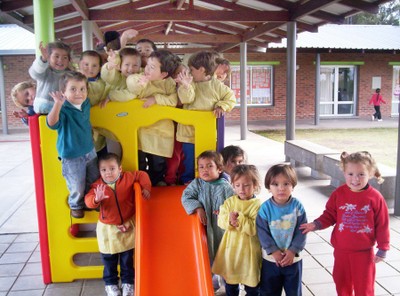Child Sponsorship background from Salto, Uruguay
 SOS Children's Village Salto
SOS Children's Village Salto
The country's second SOS Children's Village was built in the town of Salto, about 500 km northwest of Montevideo. Salto is near the Argentinian border. With 80,000 inhabitants, it is the second largest city in the country. The SOS Children's Village was constructed on a 7-acre site, which is situated about 7 km from the city.
The village consists of eleven family houses, where up to 88 children can find a new home. In addition, there is the village director's house, a house for the so-called SOS aunts (SOS mother trainees or family helpers who support the SOS mothers during their daily work and fill in for them when they are ill or on leave), the village caretaker's house, a community building with rooms for functions and festivities, a library and an administration and service area. The older children from the SOS Children's Village attend state-run primary and secondary schools. The SOS Children's Village also runs a small farm, where chicken are bred and fruit is grown.
Other SOS Projects in Salto
For youngsters from the SOS Children's Village, SOS Youth Homes have been set up in town. Young people usually move from the SOS Children's Village to an SOS Youth Home when they start a vocational training course or go on to higher education. With the support of qualified youth workers, the young people develop realistic perspectives for their future, learn to shoulder responsibility and increasingly make their own decisions. They are encouraged to develop team spirit and build up contacts with relatives and friends, as well as with the relevant authorities and potential employers.
Since September 2005, an SOS Social Centre, funded by the EU, also forms part of the SOS Children's Village Salto. The SOS Social Centre is run as a nursery and a day-care centre and has a capacity of up to 380 children from 18 months to 12 years.
The day-care centre is particularly valuable to single mothers from the area as it enables them to earn or at least contribute towards earning money for the family, safe in the knowledge that their children are being cared for by trained supervisors. Information events are held on health, balanced diets and other health issues. Supporting women is also a central concern. Further vocational training in a range of manual work is available for women, so as to improve single mothers' qualifications and therefore increase their income and improve their societal status.

 Return to Schools Wikipedia Home page…
Return to Schools Wikipedia Home page…
